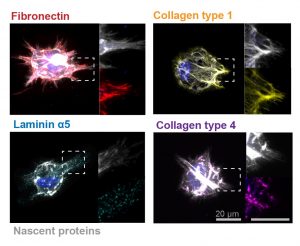by Lauren Salig

As different as muscle, blood, brain and skin cells are from one another, they all share the same DNA. Stem cells’ transformation into these specialized cells — a process called cell fate determination — is controlled through various signals from their surroundings.
A recent Penn Engineering study suggests that cells may have more control over their fate than previously thought.
Jason Burdick, Robert D. Bent Professor of Bioengineering, and Claudia Loebel, a postdoctoral researcher in his lab, led the study. Robert Mauck, Mary Black Ralston Professor for Education and Research in Orthopaedic Surgery at Penn’s Perelman School of Medicine, also contributed to the research.
Their study was published in Nature Materials.
Read the full story in the Penn Engineering Medium Blog. Media contact Evan Lerner.
